Yuxun Tang
SingMOS-Pro: An Comprehensive Benchmark for Singing Quality Assessment
Oct 02, 2025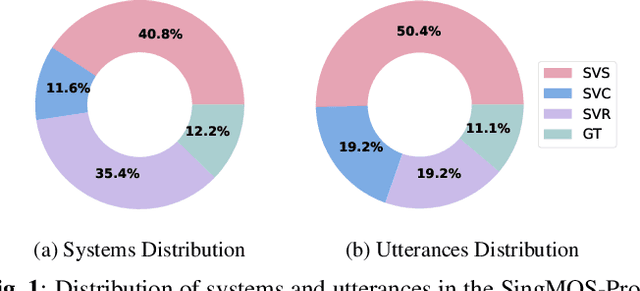

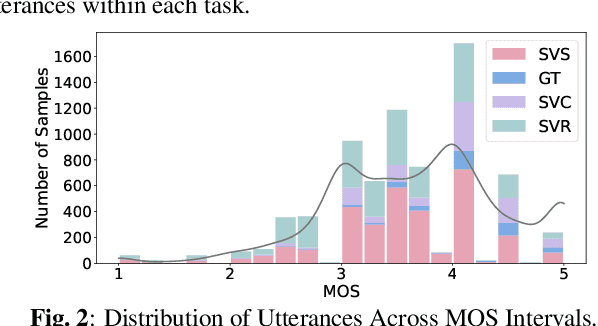

Abstract:Singing voice generation progresses rapidly, yet evaluating singing quality remains a critical challenge. Human subjective assessment, typically in the form of listening tests, is costly and time consuming, while existing objective metrics capture only limited perceptual aspects. In this work, we introduce SingMOS-Pro, a dataset for automatic singing quality assessment. Building on our preview version SingMOS, which provides only overall ratings, SingMOS-Pro expands annotations of the additional part to include lyrics, melody, and overall quality, offering broader coverage and greater diversity. The dataset contains 7,981 singing clips generated by 41 models across 12 datasets, spanning from early systems to recent advances. Each clip receives at least five ratings from professional annotators, ensuring reliability and consistency. Furthermore, we explore how to effectively utilize MOS data annotated under different standards and benchmark several widely used evaluation methods from related tasks on SingMOS-Pro, establishing strong baselines and practical references for future research. The dataset can be accessed at https://huggingface.co/datasets/TangRain/SingMOS-Pro.
VERSA: A Versatile Evaluation Toolkit for Speech, Audio, and Music
Dec 23, 2024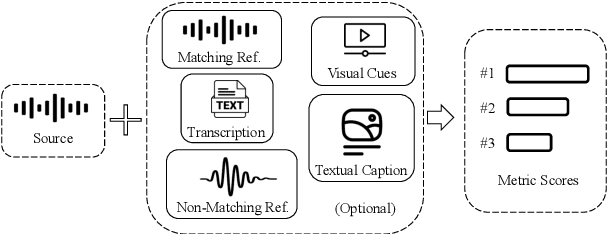
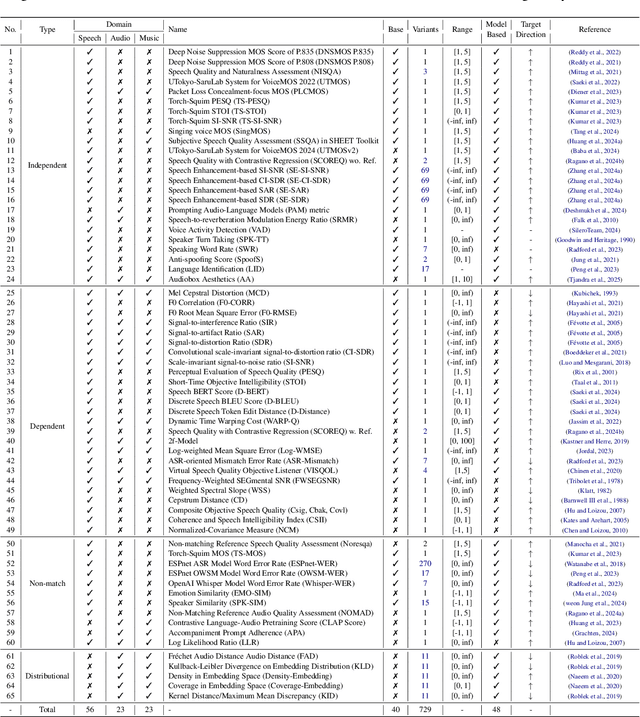
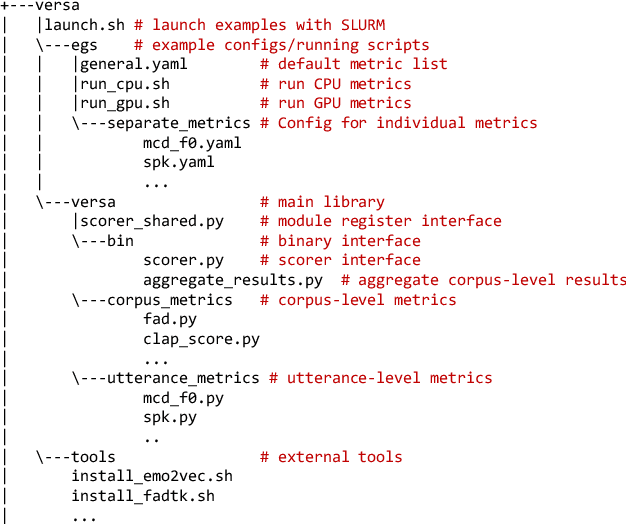

Abstract:In this work, we introduce VERSA, a unified and standardized evaluation toolkit designed for various speech, audio, and music signals. The toolkit features a Pythonic interface with flexible configuration and dependency control, making it user-friendly and efficient. With full installation, VERSA offers 63 metrics with 711 metric variations based on different configurations. These metrics encompass evaluations utilizing diverse external resources, including matching and non-matching reference audio, text transcriptions, and text captions. As a lightweight yet comprehensive toolkit, VERSA is versatile to support the evaluation of a wide range of downstream scenarios. To demonstrate its capabilities, this work highlights example use cases for VERSA, including audio coding, speech synthesis, speech enhancement, singing synthesis, and music generation. The toolkit is available at https://github.com/shinjiwlab/versa.
Dynamic-SUPERB Phase-2: A Collaboratively Expanding Benchmark for Measuring the Capabilities of Spoken Language Models with 180 Tasks
Nov 08, 2024



Abstract:Multimodal foundation models, such as Gemini and ChatGPT, have revolutionized human-machine interactions by seamlessly integrating various forms of data. Developing a universal spoken language model that comprehends a wide range of natural language instructions is critical for bridging communication gaps and facilitating more intuitive interactions. However, the absence of a comprehensive evaluation benchmark poses a significant challenge. We present Dynamic-SUPERB Phase-2, an open and evolving benchmark for the comprehensive evaluation of instruction-based universal speech models. Building upon the first generation, this second version incorporates 125 new tasks contributed collaboratively by the global research community, expanding the benchmark to a total of 180 tasks, making it the largest benchmark for speech and audio evaluation. While the first generation of Dynamic-SUPERB was limited to classification tasks, Dynamic-SUPERB Phase-2 broadens its evaluation capabilities by introducing a wide array of novel and diverse tasks, including regression and sequence generation, across speech, music, and environmental audio. Evaluation results indicate that none of the models performed well universally. SALMONN-13B excelled in English ASR, while WavLLM demonstrated high accuracy in emotion recognition, but current models still require further innovations to handle a broader range of tasks. We will soon open-source all task data and the evaluation pipeline.
ESPnet-Codec: Comprehensive Training and Evaluation of Neural Codecs for Audio, Music, and Speech
Sep 24, 2024Abstract:Neural codecs have become crucial to recent speech and audio generation research. In addition to signal compression capabilities, discrete codecs have also been found to enhance downstream training efficiency and compatibility with autoregressive language models. However, as extensive downstream applications are investigated, challenges have arisen in ensuring fair comparisons across diverse applications. To address these issues, we present a new open-source platform ESPnet-Codec, which is built on ESPnet and focuses on neural codec training and evaluation. ESPnet-Codec offers various recipes in audio, music, and speech for training and evaluation using several widely adopted codec models. Together with ESPnet-Codec, we present VERSA, a standalone evaluation toolkit, which provides a comprehensive evaluation of codec performance over 20 audio evaluation metrics. Notably, we demonstrate that ESPnet-Codec can be integrated into six ESPnet tasks, supporting diverse applications.
Muskits-ESPnet: A Comprehensive Toolkit for Singing Voice Synthesis in New Paradigm
Sep 11, 2024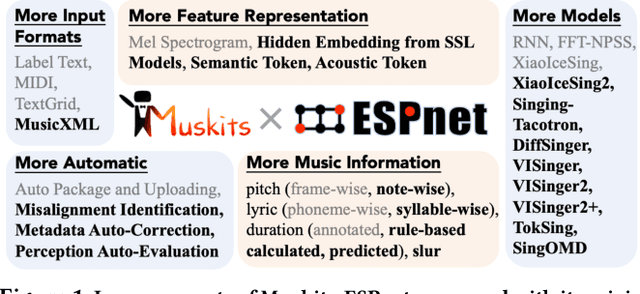

Abstract:This research presents Muskits-ESPnet, a versatile toolkit that introduces new paradigms to Singing Voice Synthesis (SVS) through the application of pretrained audio models in both continuous and discrete approaches. Specifically, we explore discrete representations derived from SSL models and audio codecs and offer significant advantages in versatility and intelligence, supporting multi-format inputs and adaptable data processing workflows for various SVS models. The toolkit features automatic music score error detection and correction, as well as a perception auto-evaluation module to imitate human subjective evaluating scores. Muskits-ESPnet is available at \url{https://github.com/espnet/espnet}.
SingOMD: Singing Oriented Multi-resolution Discrete Representation Construction from Speech Models
Jun 20, 2024Abstract:Discrete representation has shown advantages in speech generation tasks, wherein discrete tokens are derived by discretizing hidden features from self-supervised learning (SSL) pre-trained models. However, the direct application of speech SSL models to singing generation encounters domain gaps between speech and singing. Furthermore, singing generation necessitates a more refined representation than typical speech. To address these challenges, we introduce SingOMD, a novel method to extract singing-oriented multi-resolution discrete representations from speech SSL models. Specifically, we first adapt the features from speech SSL through a resynthesis task and incorporate multi-resolution modules based on resampling to better serve singing generation. These adapted multi-resolution features are then discretized via clustering. Extensive experiments demonstrate the robustness, efficiency, and effectiveness of these representations in singing vocoders and singing voice synthesis.
SingMOS: An extensive Open-Source Singing Voice Dataset for MOS Prediction
Jun 16, 2024



Abstract:In speech generation tasks, human subjective ratings, usually referred to as the opinion score, are considered the "gold standard" for speech quality evaluation, with the mean opinion score (MOS) serving as the primary evaluation metric. Due to the high cost of human annotation, several MOS prediction systems have emerged in the speech domain, demonstrating good performance. These MOS prediction models are trained using annotations from previous speech-related challenges. However, compared to the speech domain, the singing domain faces data scarcity and stricter copyright protections, leading to a lack of high-quality MOS-annotated datasets for singing. To address this, we propose SingMOS, a high-quality and diverse MOS dataset for singing, covering a range of Chinese and Japanese datasets. These synthesized vocals are generated using state-of-the-art models in singing synthesis, conversion, or resynthesis tasks and are rated by professional annotators alongside real vocals. Data analysis demonstrates the diversity and reliability of our dataset. Additionally, we conduct further exploration on SingMOS, providing insights for singing MOS prediction and guidance for the continued expansion of SingMOS.
TokSing: Singing Voice Synthesis based on Discrete Tokens
Jun 12, 2024



Abstract:Recent advancements in speech synthesis witness significant benefits by leveraging discrete tokens extracted from self-supervised learning (SSL) models. Discrete tokens offer higher storage efficiency and greater operability in intermediate representations compared to traditional continuous Mel spectrograms. However, when it comes to singing voice synthesis(SVS), achieving higher levels of melody expression poses a great challenge for utilizing discrete tokens. In this paper, we introduce TokSing, a discrete-based SVS system equipped with a token formulator that offers flexible token blendings. We observe a melody degradation during discretization, prompting us to integrate a melody signal with the discrete token and incorporate a specially-designed melody enhancement strategy in the musical encoder. Extensive experiments demonstrate that our TokSing achieves better performance against the Mel spectrogram baselines while offering advantages in intermediate representation space cost and convergence speed.
The Interspeech 2024 Challenge on Speech Processing Using Discrete Units
Jun 11, 2024



Abstract:Representing speech and audio signals in discrete units has become a compelling alternative to traditional high-dimensional feature vectors. Numerous studies have highlighted the efficacy of discrete units in various applications such as speech compression and restoration, speech recognition, and speech generation. To foster exploration in this domain, we introduce the Interspeech 2024 Challenge, which focuses on new speech processing benchmarks using discrete units. It encompasses three pivotal tasks, namely multilingual automatic speech recognition, text-to-speech, and singing voice synthesis, and aims to assess the potential applicability of discrete units in these tasks. This paper outlines the challenge designs and baseline descriptions. We also collate baseline and selected submission systems, along with preliminary findings, offering valuable contributions to future research in this evolving field.
CtrSVDD: A Benchmark Dataset and Baseline Analysis for Controlled Singing Voice Deepfake Detection
Jun 04, 2024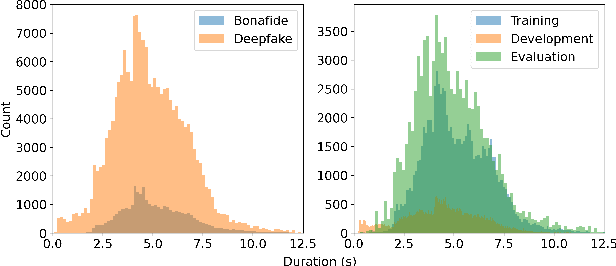
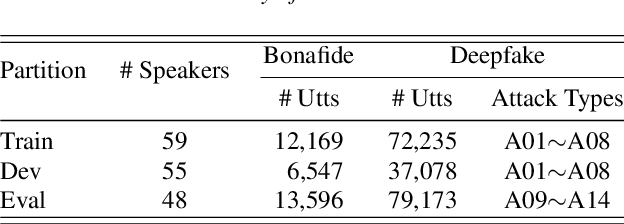
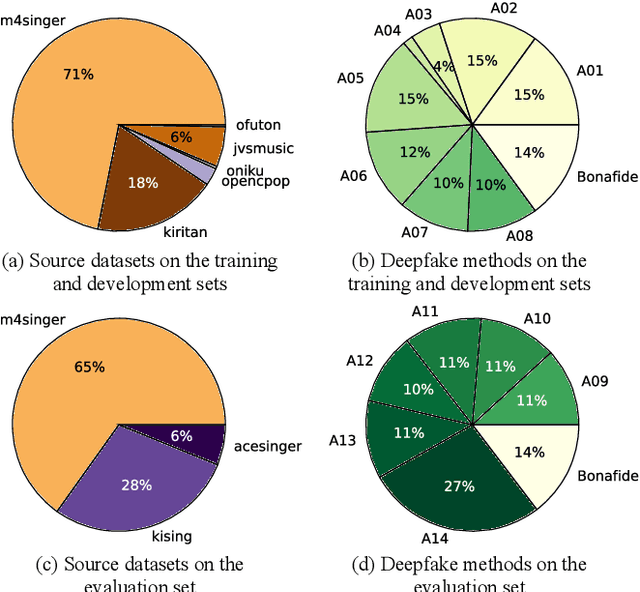

Abstract:Recent singing voice synthesis and conversion advancements necessitate robust singing voice deepfake detection (SVDD) models. Current SVDD datasets face challenges due to limited controllability, diversity in deepfake methods, and licensing restrictions. Addressing these gaps, we introduce CtrSVDD, a large-scale, diverse collection of bonafide and deepfake singing vocals. These vocals are synthesized using state-of-the-art methods from publicly accessible singing voice datasets. CtrSVDD includes 47.64 hours of bonafide and 260.34 hours of deepfake singing vocals, spanning 14 deepfake methods and involving 164 singer identities. We also present a baseline system with flexible front-end features, evaluated against a structured train/dev/eval split. The experiments show the importance of feature selection and highlight a need for generalization towards deepfake methods that deviate further from training distribution. The CtrSVDD dataset and baselines are publicly accessible.
 Add to Chrome
Add to Chrome Add to Firefox
Add to Firefox Add to Edge
Add to Edge